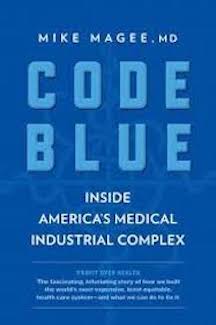Healthcare Resources
November 8, 2019
SEE ALSO:
Code Blue: Inside America’s Medical Industrial Complex is a must read for anyone who wants to understand the history of US healthcare and how we ended up with the most expensive system in the world with increasingly uncompetitive outcomes. The author, Mike Magee, is highly credentialed in the field with a resume that gives him a unique observation point. He is a doctor and a professor, has run a large hospital organization, and worked on the inside of the pharmaceutical industry as head of global medical affairs at Pfizer. His work, while ambitious, is accessible, well organized, scrupulously footnoted, and persuasive.
Perhaps one of the most fascinating aspects of the history of US healthcare is the intellectual framework from which it was launched. During the US occupations of Germany and Japan, US policymakers determined that the health of a nation is fundamental to its construction and development. As such, they led the design of the universal health systems in Germany and Japan that are so successful today. Canada followed suit, defining an overriding goal of ensuring “a healthy Canada and healthy Canadians.” Meanwhile, in our own country, policymakers resisted the same proposals by both Roosevelt and Truman in order to preserve the unshackled free enterprise of our system.
February 21, 2019
For our readers who subscribe to the NY Times, today’s issue has a helpful opinion page article on healthcare by Dr. Jamie Daw. Dr. Daw teaches health policy and management at Columbia University. His piece is titled “A Better Path to Universal Health Care: The US should look to Germany not Canada, for the best model.” In it, Daw responds to Kamala Harris’s reference to the elimination of insurance companies. He points out, accurately, that Germany administers its healthcare through several hundred nonprofit providers. They compete for customers based on service and price, thus preserving an element of competition. Germans choose their provider and contribute to the cost. Employers also contribute, regardless of the provider the individual selects. Such insurance can then be portable when employment is changed. The government provides subsidies based on need. The result is that the cost of the administration of healthcare is significantly reduced compared to the cost in the US.
February 21, 2019
One obstacle to healthcare reform in the US is the uninformed belief of many Americans that government-provided healthcare around the world is a failure. We often hear criticisms that such systems ration care through long lines, have poor outcomes, etc. As we discuss in our Healthcare Research, this is not the case. For a well researched, well written, and easily digestible discussion of healthcare systems around the world, we highly recommend The Healing of America: A Global Quest for Better, Cheaper and Fairer Health Care by T. R. Reid, published by Penguin Books.
Reid is an American reporter and author who traveled widely to examine firsthand the healthcare systems in several countries, including Germany, France, and Japan. This is a must read for anyone who really wants to understand how countries provide better outcomes at a substantially lower cost than does the US.
February 12, 2019
In America’s Bitter Pill, author Steven Brill provides an in-depth look at the effort to design and pass the Affordable Care Act. This is a must read for anyone who wants to understand the forces standing in the way of healthcare reform in the US. As we outline in our Healthcare Research, government-provided programs in countries like Germany, France, and Japan generally do three things, albeit in different ways. They administer claims through a nonprofit system of some kind, they regulate drug prices, and they regulate the compensation of providers. The result is a less expensive system that is then affordable to everyone. In America’s Bitter Pill, Brill gives us an up-close look at how the lobbying power of the AMA, the drug companies, and the insurance companies stood in the way of meaningful reform.



